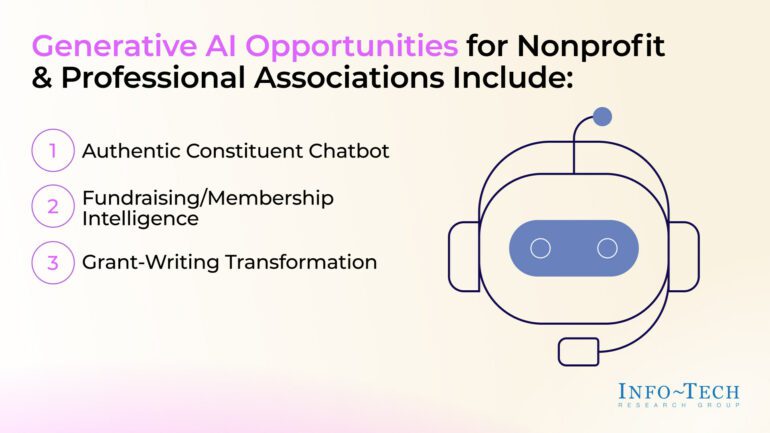TL;DR:
- Info-Tech Research Group introduces the Generative AI Use Case Library for Nonprofit & Professional Associations.
- This resource aims to accelerate the adoption of AI in these sectors by providing practical use cases.
- IT leaders in nonprofits are urged to develop Gen AI roadmaps rapidly and responsibly.
- Gen AI can enhance constituent service, fundraising, and grant-writing processes.
- The adoption of Gen AI in nonprofits and professional associations has the potential to transform their operations.
Main AI News:
In an era where AI adoption is swiftly becoming the norm across various industries, nonprofit and professional associations have remained cautious, exercising prudence due to concerns raised by Gen AI technologies. These concerns, often magnified by media portrayals, have cast a shadow over the adoption of AI within these sectors. The hesitancy is further exacerbated by the lack of organizational clarity among IT leaders on how to formulate a Gen AI strategy that aligns with their business objectives and governance models. To alleviate this predicament and to guide IT teams in the nonprofit sector towards embracing AI, Info-Tech Research Group has unveiled its latest offering: the Generative AI Use Case Library tailored for the Nonprofit & Professional Associations Industry.
This comprehensive resource from Info-Tech Research Group outlines practical and value-driven use cases for generative AI, with the aim of catalyzing a transformative shift within nonprofit and professional associations. According to Info-Tech’s Future of IT survey, approximately one in five IT leaders have already integrated AI into their business strategies, underscoring the urgency for IT leaders in the nonprofit sector to initiate AI integration within their operations.
Neil de Ridder, Managing Partner, Executive Services at Info-Tech Research Group, emphasizes, “Gen AI holds immense transformative potential for nonprofits and professional associations, yet its adoption has been sluggish due to industry caution. Info-Tech’s use case libraries empower organizations in the nonprofit sector to strategically embrace Gen AI, aligning technology with mission-critical initiatives and delivering impactful outcomes for their communities.”
Within this resource, Info-Tech delves into the industry’s struggle with the advent of Gen AI. A prevailing uncertainty prevails on where to commence, reflecting a lack of comprehension regarding its potential applications and how they can be harmonized with strategic objectives. Heightening concerns about AI risks, particularly those affecting constituent privacy, organizational reputation, and data security, have exacerbated the situation, emphasizing the industry’s urgent need for guidance through these uncharted waters.
De Ridder elucidates, “Nonprofits and professional associations encounter challenges in navigating the Gen AI landscape. Info-Tech’s approach goes beyond technology; it prioritizes responsible and purpose-driven implementation. Our Gen AI use case library for nonprofits and professional associations provides the compass these organizations need to confidently leverage AI while staying true to their mission and embracing innovation.”
Info-Tech recommends that IT leaders within nonprofit and professional associations expedite the development of a Gen AI roadmap, emphasizing the importance of doing so with agility and responsibility. This strategic approach offers numerous advantages, including:
- Authentic Constituent Chatbot: IT can deploy constituent service chatbots with human-like responses for complex inquiries.
- Fundraising/Membership Intelligence: Organizations can leverage Gen AI to nurture donors and members, increasing the likelihood of donations or memberships.
- Grant-Writing Transformation: AI can streamline grant application processes, offering time-saving benefits.
In this blueprint, Info-Tech Research Group demonstrates that Gen AI can seamlessly integrate into nonprofit and professional associations when approached with meticulous planning and a strong sense of responsibility. By strategically implementing Gen AI, the industry can fully harness its potential to drive its mission forward with efficiency and efficacy.
Conclusion:
The launch of Info-Tech’s Generative AI Use Case Library signifies a pivotal moment for nonprofit and professional associations. With practical applications and guidance readily available, these sectors can confidently embrace Gen AI, revolutionizing their operations and enhancing their impact on the communities they serve. This development underscores the growing importance of AI in reshaping the nonprofit landscape and presents opportunities for technology providers to cater to this burgeoning market.

